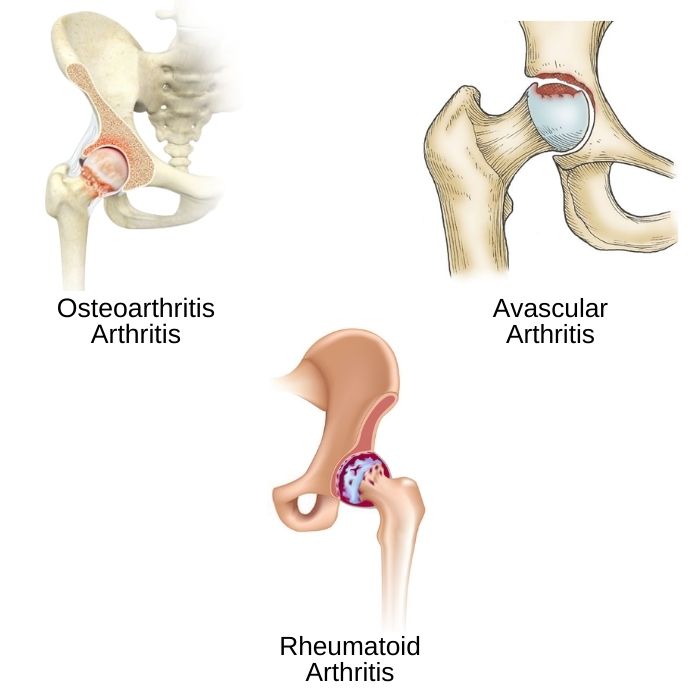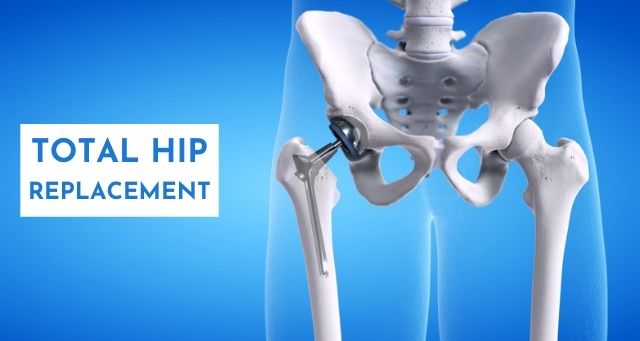What is Total Hip Replacement & its overview:
The hip is one of the strongest joints in your body and bears the maximum load of your body’s weight. The hip joint is used during walking and it supports your body’s framework even during rest, so once it gets worn out, you experience hip joint pain even when you are at rest.
The most common causes responsible for worn-out hip joints are Osteoarthritis, Rheumatoid Arthritis, Avascular Necrosis (AVN) and Post Traumatic Arthritis after failed fracture surgery. They cause damage to the cartilage lining the bones at the joint which allows the joint to move smoothly. This leads to persistent pain, muscle weakness, joint stiffness, and difficulty in performing daily activities. All these problems lead to the need for Hip joint replacement surgery, if not responding to non-surgical treatment.
During hip replacement surgery (also called total hip arthroplasty), parts of your hip joint that have been damaged are replaced with prosthetic parts. In hemi replacement only the head of the femur (“ball”) is replaced whereas in total hip replacement the head of the femur as well acetabulum is replaced (both “ball and socket”)
WHY DO YOU NEED A HIP REPLACEMENT?
Conditions that can damage the hip joint, sometimes making hip replacement surgery necessary, include:

- Osteoarthritis. Commonly known as wear-and-tear arthritis, osteoarthritis damages the smooth cartilage that closes the ends of the bones and helps the joints to move.
- Rheumatoid Arthritis: Caused by an overactive immune system, rheumatoid arthritis produces severe inflammation of the joint that can destroy the cartilage and adjacent lower bone, causing injury.
- Osteonecrosis/ AVN (avascular necrosis of hip): If there is not enough blood supply to the hip joint, which could be the result of fracture, previous hip surgery or sometimes on its own, the bone may collapse and wear out causing severe symptoms.
WHEN DO YOU NEED A HIP REPLACEMENT?
There are no set rules about when to get a hip replacement done. But, Yes if you experience hip pain which
- Is persistent and does not get relieved by the use of painkillers.
- Worsens with walking, despite using a cane or walker.
- Interferes along with your sleep
- Makes it tough to get dressed
- Affects your ability to go up or down stairs
- Makes it hard to rise from a seated position.
WHAT HAPPENS DURING A HIP REPLACEMENT SURGERY?
The surgery takes a few hours. To perform a hip replacement, your surgeon:
- Makes an incision over the hip joint and removes diseased and damaged bone and cartilage, leaving wholesome bone intact.
- Implants the prosthetic socket into your pelvic bone, to replace the damaged socket.
- Replaces the spherical ball on the pinnacle of your femur (thigh bone) with the prosthetic ball, that is connected to a stem that fits into your thigh bone
- Techniques for hip replacement are continuously evolving. Surgeons continue to evolve techniques, which might reduce recovery time and pain.
HOW LONG DOES THE HIP REPLACEMENT LAST?
Your new hip is designed to serve you nicely for the long term; however, it won’t be lasting forever. Studies suggest that 90 percent of the hip replacements still function well 15-20 years after they're implanted, but with advancements in recent joint replacement techniques, they may last even longer. To help preserve your synthetic hip longer, live an energetic life, however, avoid excessive-effect sports, and stay at a healthy weight.
THINGS YOU CAN DO TO FASTEN YOUR RECOVERY
Practising these general hip replacement healing pointers assist you to have a smooth and successful recuperation.
- Getting up and becoming active following surgery is vital to speeding up your recovery after a hip replacement. Movement is vital to healthy healing.
- Pay attention to weight management, extra weight can put a strain on your new hip prosthesis and increase wear and the danger of complication.
Exercise to Promote Blood Flow, Certain exercises can help to promote blood flow and prevent clots. These include:
- Regularly squeezing the thigh and calf.
- Motion exercises for the legs that utilize the full range of leg motions
- Walking with or without the assistance of supportive devices (such as walker/cane)
LIFE AFTER A HIP REPLACEMENT SURGERY
Hip Replacement is a procedure wherein a diseased hip joint is changed with one made artificially using ceramic or metal alloys. Surgery has emerged as quite a common option nowadays to provide dramatic relief from hip joint pain.
Discharge from hospital: After analyzing your potential to perform certain responsibilities like getting away from bed or on foot with a device like a cane or a walker and assessing your pain degree, you may be discharged. The doctor will give commands to be observed at home like medication, explaining the complications like a blood clot or swelling.
Lifestyle after hip replacement: After discharge, complete and speedy healing may be made by means of following the health practitioner’s commands and taking certain precautions at home.
Care at home: After discharge, you may need to take up the offerings of a caretaker or a member of the family for numerous weeks. You may additionally need to make certain adjustments at home to help your recuperation like getting new furniture that will be at ease so as to sit down without straining your hip. You may also ought to elevate the bathroom seat to allow you to sit down without problems.
ROLE OF PHYSIOTHERAPY DURING RECOVERY PERIOD
- A Successful Total Hip Replacement surgery is half the battle won. It is very important to opt for physiotherapy rehabilitation to maximize the benefit of successful replacement surgery.
- It increases the mobility and functionality of the hip joint by building up muscle strength around the new joint.
- It helps to minimize complications such as deep vein thrombosis, wound infection, hip dislocation, and pulmonary embolism.
- A person may need to undergo physiotherapy for a few weeks after the surgery to get back to normal.
- Therapy starts almost immediately in most cases while you are still in the hospital.
A NOTE FROM RACE KNEE CLINIC
Don’t limit your life & restrict your movements because of hip pain. There are ways with which you can manage your pain and enjoy those lively moments again which were once taken back by that pain & discomfort.
We are RACE KNEE CLINIC, situated in the heart of Ahmedabad City with STATE-OF-ART Technology to deliver INTERNATIONAL STANDARD HEALTHCARE & HUMAN CARE.
We are also there with you for OPD Consultation in the following cities:
- Surat
- Ahmedabad
- Kolkata
- Jaipur
- Bikaner
- Jodhpur
- Pali
- Udaipur
- Nokha
- Raipur
- Guwahati
- Siliguri
If you have Hip Pain or Suffering from any type of joint pain you can contact RACE KNEE CLINIC to get the best consultation and treatment for your problem.

